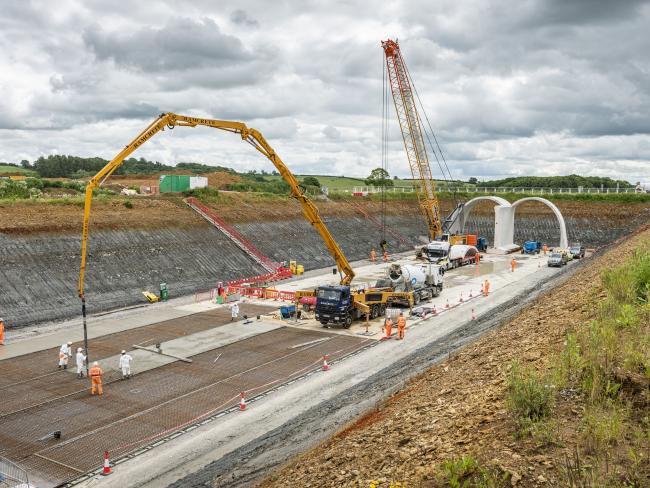14 March 2023

Construction of one of several cut and cover tunnels for HS2 in Northamptonshire designed to minimise the use of steel and concrete. Photo mwmbwls via Flickr (CC BY-NC-SA 2.0).
Transport secretary Mark Harper announced on 9 March that much-needed spending on new transport projects will be delayed. Dressed up as more investment, the plans have attracted criticism from the industry as well as some unions.
The fear is that much of this infrastructure work will be eventually axed altogether. And where they do go ahead, designs will be reviewed and revised; supposedly to save money. That approach can often lead to greater costs and further delays in the end.
“Re-phased”
The delays to the full opening of phases 1 and 2 of HS2 have captured the headlines. But investment in key road schemes has also been “re-phased”, a phrase that hides a multitude of issues.
The full HS2 rail line from London to Manchester was due to open between 2035 and 2041, but the work is now pushed back by at least 2 years for the first phase to Birmingham. And HS2 will not reach Manchester until 2045.
‘Cut-down HS2 will not realise benefits for rail freight.’
One of the key benefits of the HS2 project would be the extra capacity that allows increased rail freight. But the latest cut-down plan is not likely to realise many of those benefits, according to the rail freight industry. The head of GB Railfreight, John Smith, called the revised plan a “half baked” effort.
Fears
The opening of the central London terminus at Euston will also be delayed. There are now real fears that the line to Euston will never be completed. Trains will be forced to end the journey in west London at Old Oak Common; the planned interchange to the Elizabeth Line would probably have to be redesigned.
The HS2 “eastern leg” to Leeds had already been scrapped in 2021. Instead the government proposed a spur to the East Midlands, which itself now looks to be vulnerable to cancellation or delay.
Undermined
The government’s Integrated Rail Plan announced at that time was supposed to transform transport in the Midlands and the north of England. But the latest delays undermine key elements of that plan too.
Sir John Armitt, Chairman of the National Infrastructure Commission, said “The cheapest way is to build it as quickly as possible…The more you spin it out, the more you’ve got future inflation. It creates more uncertainty.”
Uncertainty
And that uncertainty is already undermining confidence amongst suppliers and contractors about investment decisions in respect of both rail and road. That is likely to lead to some pulling out altogether.
Britain’s three main train manufacturers – Alstom, Hitachi and Siemens – have sought assurances from the government about their contract to build new HS2 trains. They employ around 20,000 workers, who face an uncertain future if there are cuts to the trains on order, along with thousands more in the supply chain.
Road schemes now pushed back at least 2 years and being revisited include the strategically important Lower Thames Crossing east of the current Dartford Crossing, the A27 Arundel bypass in Sussex, and the new A5036 Port of Liverpool access road.
